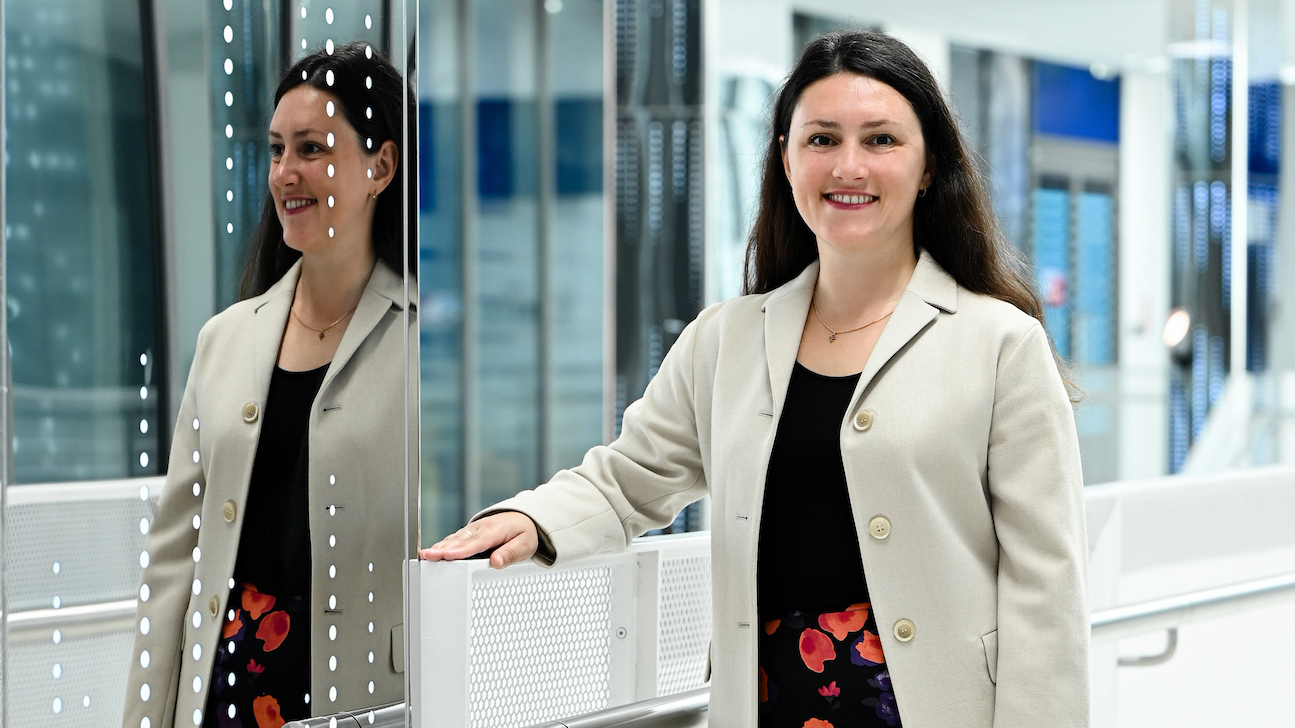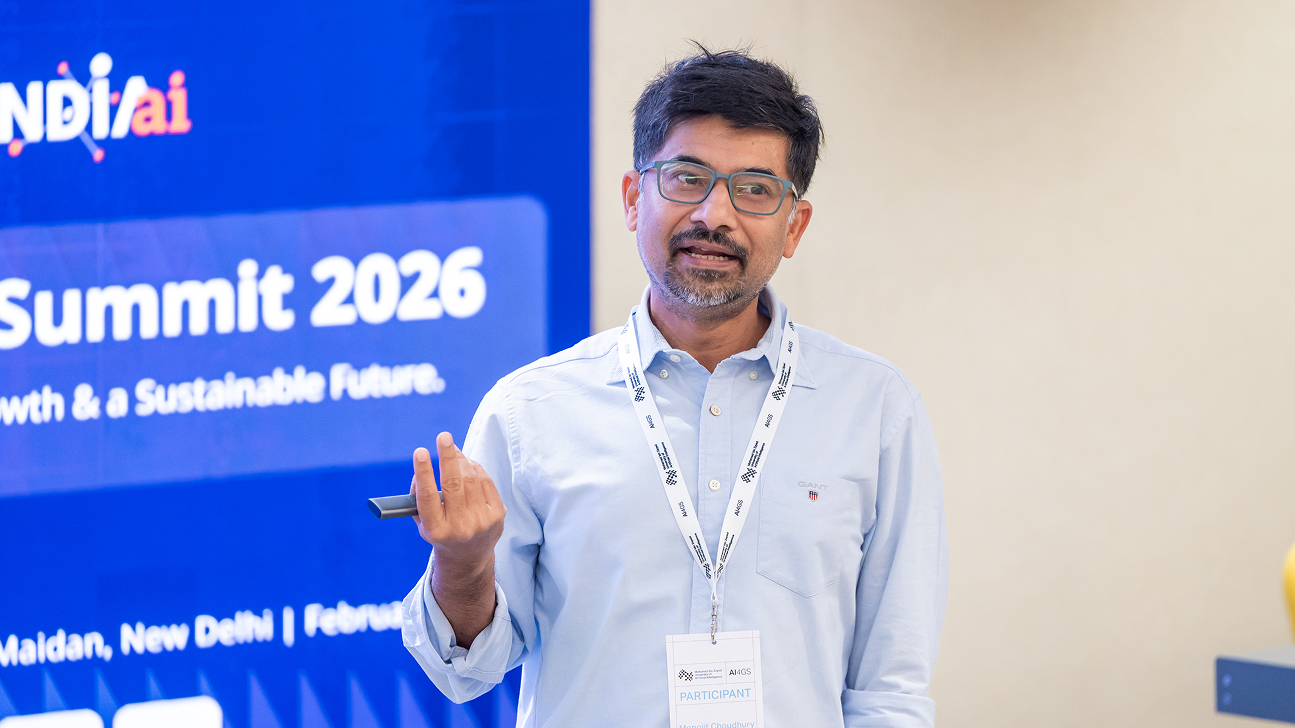Working towards a hybrid, human and AI-powered education system
Wednesday, March 08, 2023

Artificial intelligence (AI) is being used to “democratize education” and give greater access to powerful learning tools especially for disadvantaged groups including lower socioeconomic families, remote communities, those with learning disabilities or barriers to traditional learning, and girls and young women in certain parts of the world.
AI usage in education is a multi-billion dollar industry; growing at an annual rate of 36%. By 2030, AI in education is expected to become a $32 billion industry (Grand View Research, 2022). Generative AI is already being used by large tech companies such as OpenAI, Microsoft, Google, Meta Platforms and IBM, and this technology is ready to contribute to the transformation of education. To do so, it needs to be embedded in an appropriate framework to ensure it is pedagogically useful.
And one of the most passionate experts and researchers in the field of intelligent tutoring systems (ITS) and AI-assisted learning is leading the charge – Ekaterina Kochmar, newly appointed assistant professor of natural language processing (NLP) at Mohamed bin Zayed University of Artificial Intelligence (MBZUAI). She landed in Abu Dhabi last month, and is the university’s third full-time, female faculty since opening in 2020.
Kochmar has always loved linguistics, the underlying structure behind language, and the elegant mathematical rules tying it altogether. She is native in Russian, fluent in English and intermediate in German and French. She joined MBZUAI to feed her need to conduct solutions-focused and applicable research at the intersection of AI, NLP and ITS.
“I was originally interested in languages and linguistics, but quickly realized technology can help me to work in this area much more successfully,” she said. “I’m very passionate about research as it is the best way to introduce and incorporate the ideas we have as a great society of scholars and academics. We want to implement them and make them work in real life. That is what drives me, and that’s what inspires and encourages me to do more research.”
Transforming education with AI-teachers
At only 30 years of age, Kochmar co-founded Korbit AI, an AI-powered dialogue-based tutoring system capable of providing learners with high-quality, interactive, and personalized education in science, technology, engineering, and mathematics (STEM) subjects. As Korbit AI’s chief scientific officer, she aims to break down barriers and provide personalized, high-quality education for millions around the world at minimal cost.
[wps_pull-out-quote-right content=”I strongly believe that AI should help teachers, should help students, and should seamlessly be integrated in the learning process.” surename=”Ekaterina Kochmar” source=”MBZUAI Assistant Professor of Natural Language Processing”][/wps_pull-out-quote-right]“Korbit AI’s main goal is to democratize education by using AI methods to help make education available to people on a global scale,” Kochmar states. “Unfortunately, high-quality education is not accessible to many people around the world including school-age children and we know that girls can be affected more severely in some areas. AI opens the door to those living in remote areas, children who cannot afford to go to school, or those who can’t access the traditional school system. Devices and internet access are much more widespread these days – more so than high-quality state schools or university education.
“It can be redefined to help people with learning disabilities such as dyslexia or other learning difficulties. Also, by reducing the pressure and stress in the classroom environment for students who are shy or lack the confidence to speak up. They may not be brave enough to ask questions and so various technologies personalized for them may work better.”
Now 36, Kochmar is on a mission to give all her students – both at MBZUAI and in the virtual classroom – the power to advance their careers, further their studies, improve their communities, and change the world with at a speed incomparable to traditional education.
She wants to break down stereotypes of who can or should work in STEM fields from the very outset of foundational learning, which is why Korbit AI and her book titled Getting Started with Natural Language Processing (2022) concentrate on entry level learning in NLP, machine learning, data science, and AI techniques and models.
Is this the end of traditional classroom education?
It is Kochmar’s belief that AI will never replace teachers; but it will make their jobs easier, improve their satisfaction levels, and lead to higher student outcomes. The daughter of two teachers herself, she recognized early on in her research that one-on-one assessment and advice, as well as human interaction in the classroom or even via videoconferencing tools will never be replaced by AI.
“The best way we can approach education is with human one-on-one tutoring, but it is impossible to provide everyone with such a tutor,” Kochmar explains. “With AI tutors, we are trying to improve the way that education works for everyone, and make it really personalized so that the educational needs of every student can be addressed.
“I strongly believe that AI should help teachers, should help students, and should seamlessly be integrated in the learning process,” she continues. “It shouldn’t replace teachers. We know that AI has complementary strengths with teachers. And the way I see the future of education is that it will be a hybrid system in which certain tasks can be offloaded to AI, while teachers can then focus on more interesting, more challenging tasks and questions to discuss with the students. That way the technology really benefits everyone.
“A good example here is the process of marking which usually is quite standard and takes a lot of time for teachers. There are other things that are not done well by AI, for example, giving advice to students about the career path, and the selection of subjects most suitable for them to succeed.”
McKinsey & Company (2020) research suggests that 20 to 40% of current teacher hours are spent on activities that could be automated using existing technology. That translates into approximately 13 hours per week that teachers could redirect toward activities that support student learning. This would be a game-changer for overworked and stressed educators.
We don’t want to rewrite history
Kochmar is the president of the ACL Special Interest Group on Educational Applications (SIGEDU), and in September last year she was named chair of the International Alliance to Advance Learning in the Digital Era (IAALDE). The alliance is working with many educational societies around the world on how best to integrate AI and education. As with most advancements in society, it comes with opportunities and challenges, and requires guidelines for best practice.
“The technology is already at the level where we can use it to provide people with high-quality education,” Kochmar explains. “The time is ripe as people’s attitudes towards technology are changing all the time, and many more countries have accessible internet and devices which is the basis for such technology being implemented.
“The field of AI in education is still a relatively young one. We know that we have reached the point where we can bring all this effort together and now, one of the major challenges is installing the right framework. Researchers all over the world are working on this at the moment.
“ChatGPT is a good example of where the technology has reached the point where it can basically provide us with a lot of material, but we need to understand how to integrate it properly into a high-quality educational process and make sure that it doesn’t mislead students and provides them with factual and correct advice. We don’t want to rewrite history!”
Korbit AI concentrates on STEM which offers predefined answers within certain parameters. One of its biggest challenges is interpreting the technical language around AI and machine learning. The technology can be adapted for other domains; however, it adds the notion of debate and different viewpoints.
“It’s possible to apply AI tutoring to other domains as well such as social sciences,” Kochmar said. “The goal will just be different and there will be more layers. In some subjects, there is not one correct answer, so it is about discussing things, which creates an additional challenge. It will be more about teaching people how to debate, support an argument, and make observations. We must accept that for certain topics there are multiple, correct answers, and it’s better to present your informed point of view.”
In these instances, the AI must not be biased, and the human-algorithm creation must not be affected by personal preconceptions, gender, culture, or politics. It must follow good quality datasets and be capable of assessing student’s answers, providing tips, hints and evaluating what is missing. This interactivity with the AI tutor is what similar platforms such as Coursera lack despite having a much wider set of courses.
Celebrating International Women’s Day 2023
One of the missions for today’s International Women’s Day (March 8, 2023) is to elevate and advance gender parity in technology and celebrate the women forging innovation.
“My best advice for women starting in this field is to pursue your dreams, to stay focused, to stay determined, to believe in yourself, and to remember that setbacks happen to everyone,” Kochmar advises. “It’s more about what you would like to do with your life. For example, if STEM subjects and AI pique your interest, I’d encourage you to work in these areas. They’re very interesting, dynamic areas. So just stay determined and do your best.”
“The best thing about being a woman in STEM is that you can contribute with a different perspective. It’s very valuable to bring different perspectives on how the technology works, how AI works – and it’s not just about being a woman or a man – it’s about looking at these things from different angles.”
Kochmar says the barriers she feels as a young female academic are due to the fierce competition the sector demands, especially science and technology. “I remember the first time I tried to publish a paper; it didn’t get accepted. I was on the verge of, “Am I going to do this, or will I just quit right now?” This was my very first experience during my Ph.D. of publishing a paper. That sets you back a bit,” Kochmar said.
“People you don’t know may be quite critical of your work and you can’t respond to them because your papers are reviewed blindly,” she continued. “This may disappoint quite a lot. This led me to persevere. If you’re determined that’s what you want to do, you will need to overcome these barriers all the time. Every time you apply for research grants, for instance, or write a paper that you will have to defend, you’re going to have to be determined because there will be setbacks and there will be failures.
“Recently, a professor who is a high achiever in his field published a post about all the grants and jobs he didn’t get, all the papers that didn’t get accepted and were rejected from one venue but then resubmitted and accepted at another and awarded best paper. It goes to show that it’s more about determination and self-belief. It’s important to remember that other people actually struggle with similar things but rarely talk about them or publicize them.”
About Ekaterina Kochmar
[wps_image-right image=”https://staticcdn.mbzuai.ac.ae/mbzuaiwpprd01/2023/03/Ekaterina-inner-pic.jpg” caption=” MBZUAI Assistant Professor, Ekaterina Kochmar” first-paragraph=”Prior to joining MBZUAI, Kochmar worked as a lecturer at the Department of Computer Science of the University of Bath (2021–2023) where she was part of the AI research group; and prior to that, she was a postdoctoral researcher at the ALTA (Automated Language Teaching and Assessment) Institute at University of Cambridge focusing on the development of educational applications for second language learners.” second-paragraph=” Her research contributed to the building of Read & Improve, a readability tool for non-native readers of English, and to the building of Korbit AI, a dialogue-based ITS, developed by the company which she co-founded in 2017.”]
She holds a Ph.D. in Natural Language Processing and a Master’s in Advanced Computer Science from the University of Cambridge (United Kingdom), a Master’s in Computational Linguistics from the University of Tübingen (Germany), and a Diploma in Mathematical and Applied Linguistics from St. Petersburg State University (Russia).
As well as her roles as president of SIGEDU and chair of IAALDE, Kochmar is an area chair in NLP Applications for ACL 2023 and an action editor for the ACL Rolling Review; prior to that she served as an area chair for EMNLP 2022 and ACL 2019, and was part of the programme committees of the top-ranked international conferences in the field, including ACL, NAACL, EMNLP, AAAI, COLING, BEA, LREC, *SEM, as well as multiple ACL workshops.
Kochmar is an important part of MBZUAI’s growing and diverse NLP Department.
Related
Teaching language models about Arab culture through cross-cultural transfer
New research from MBZUAI shows how small, targeted demonstrations can sharpen AI cultural reasoning across the Arab.....
Read MoreAI and the silver screen: how cinema has imagined intelligent machines
Movies have given audiences countless visions of how artificial intelligence might affect our lives. Here are some.....
- cinema ,
- art ,
- fiction ,
- science fiction ,
- artificial intelligence ,
- AI ,
Balancing the future of AI: MBZUAI hosts AI for the Global South workshop
AI4GS brings together diverse voices from across continents to define the challenges that will guide inclusive AI.....
- languages ,
- representation ,
- equitable ,
- global south ,
- AI4GS ,
- event ,
- workshop ,
- inclusion ,
- accessibility ,
- llms ,
- large language models ,


